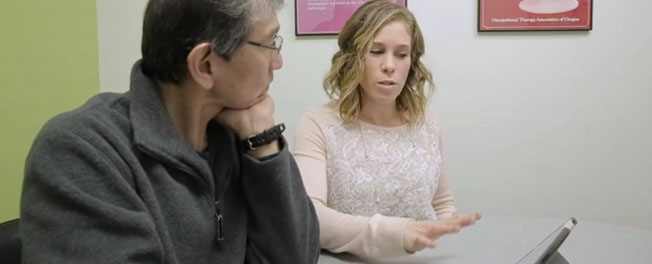
Cognitive and Occupational Performance Laboratory
General Laboratory Description
Dr. Foster directs the Cognitive and Occupational Performance Laboratory, which generates knowledge to guide the development of more effective and comprehensive rehabilitation programs for individuals with Parkinson disease or other neurodegenerative disorders and cognitive dysfunction. Rigorous translational approaches are used to understand functional cognition, occupational performance and participation in these conditions and to develop and test complex behavioral interventions to support them. The lab has collaborations that capitalize on its expertise related to cognition, Parkinson disease and occupational performance and is involved in the program development and evaluation efforts of the St. Louis Chapter of the American Parkinson Disease Association (APDA).
General Description of Student Activities
Students will have the opportunity to participate in lab activities such as literature reviews; study management; data collection, entry and analysis; scientific writing and presenting; and interacting with and testing study participants. They will work with individuals with neurological disorders and their families, other scientists and clinicians (neurologists, psychiatrists, psychologists, neuroscientists), and community organizations such as the St. Louis Chapter of the APDA. They will develop an understanding of the effects of neurodegenerative disorders on occupational performance and participation and investigate evidence-based intervention approaches to address them. The primary focus of many of Dr. Foster’s studies is cognition in Parkinson disease, but it is possible for student projects to investigate other topics and populations. Time requirements are in line with the Program in Occupational Therapy expectations.
Examples of Projects
- Metacognitive strategy training for people with Parkinson disease
- Prospective memory in Parkinson disease
- Cognitive Stimulation Therapy for people with Parkinson disease
- Improvisational Dance for people with Parkinson disease
- Cognitive function in systemic lupus erythematosus
PhD Mentor Information
Dr. Foster’s research contributes to the understanding of everyday cognitive function in Parkinson disease (PD). Her studies have demonstrated that cognitive deficits in non-demented individuals with PD are associated with poorer performance of and reduced participation in complex activities of daily living. This work has formed the foundation for the development of cognitive intervention strategies to improve everyday function and quality of life in PD. One line of Dr. Foster’s research is related specifically to prospective memory, as it is a highly relevant cognitive process for real-world functioning. Her studies in this area have contributed significantly to the understanding of prospective memory function in PD and healthy aging in both experimental and more naturalistic contexts. Her lab has begun developing and testing intervention strategies for prospective memory based on this work and has extensive knowledge and experience with the measurement of prospective memory across the lifespan and in healthy populations and those with PD.
Dr. Foster’s research also involves the development and use of functionally relevant cognitive assessments. This work has produced translational assessment batteries, clinically relevant assessments and measurement models that can be used to understand the connections between brain structure/function, laboratory-based behavior and function in everyday life.
Research Foci
- Examining how neurocognitive deficits manifest in everyday life to affect occupational performance and participation
- Determining how to assess functional cognition in people with neurological conditions
- Identifying what interventions address functional cognition and support occupational performance and participation in people with neurocognitive dysfunction
- Determining how best to promote transfer/generalization of learning from laboratory or clinical contexts to everyday life
- Identifying the mechanisms of and potential intervention strategies for prospective memory impairment in people with neurocognitive dysfunction

